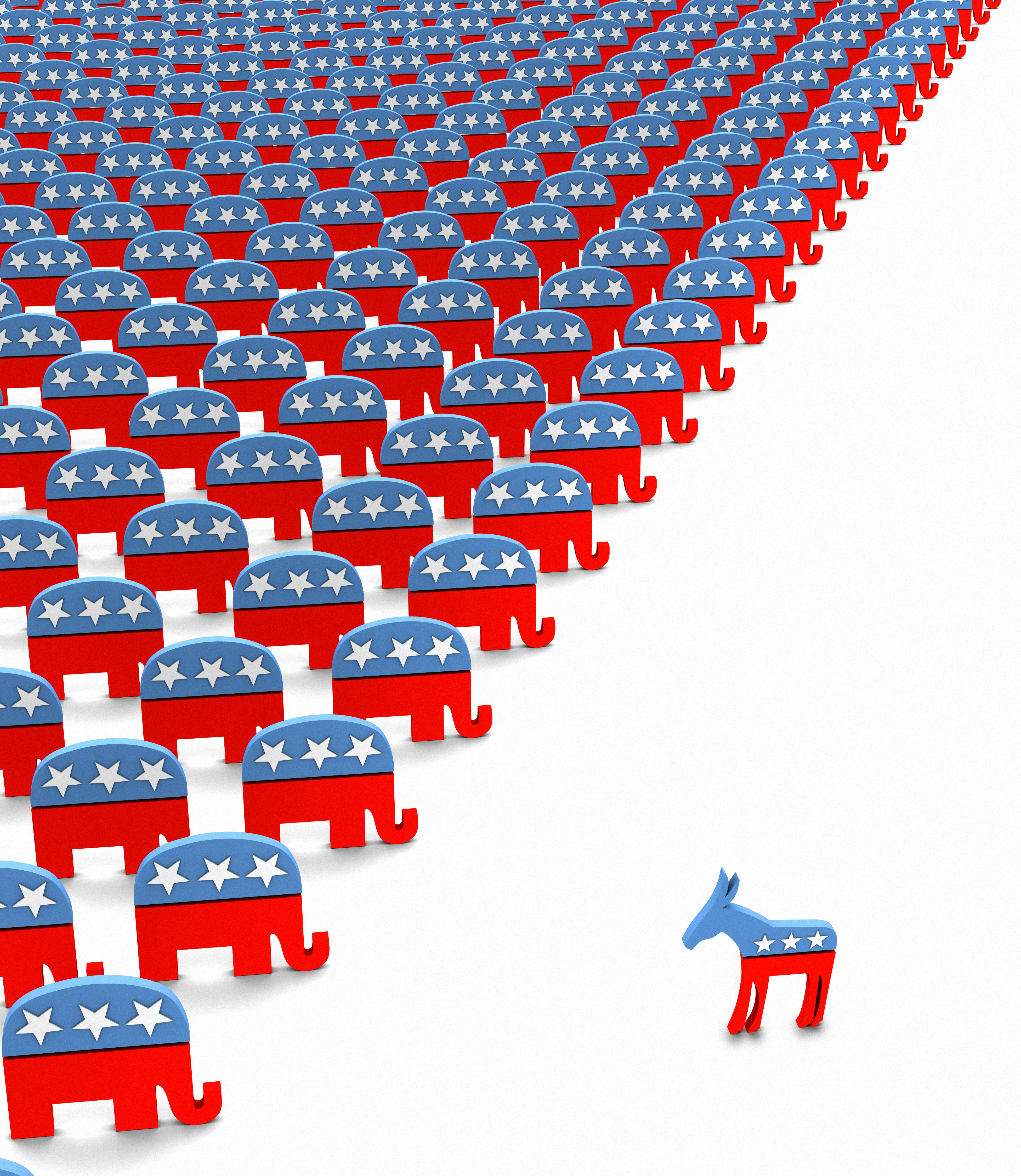Why a 20-candidate field would actually be great for the GOP in 2016
Democrats seem gleeful. They should be terrified.


In the past week, several more Republicans, with varying degrees of gravitas, have joined an already crowded field of contenders. Lindsey Graham became the fourth sitting senator to enter the race. Former New York Gov. George Pataki is in, too — despite not having been in office in nearly a decade. Rick Santorum recently announced as well, looking to springboard off of a 2012 runner-up finish. Mike Huckabee is going even farther back, hoping to springboard off of his 2008 runner-up status.
Ohio Gov. John Kasich has made it clear he intends on entering. His counterpart in Michigan, Rick Snyder, has a national speaking tour planned to showcase his so-far-successful rescue of Detroit, just coincidentally as the presidential sweepstakes heats up. Other sitting governors, like Susana Martinez and Nikki Haley, younger and perhaps better positioned to inspire voters, have stayed quiet but could jump into the race. And of course, there's Ted Cruz, Rand Paul, Marco Rubio, Jeb Bush, Carly Fiorina, Ben Carson, Chris Christie, Rick Perry — and on and on and on.
The unprecedented level of talent produced from Republican gains over the last decade has given voters a wide range of options. That has created worry over party schisms and paralysis, perhaps leading to the unicorn of political reporting, the brokered convention. Time wondered this weekend whether anyone could accurately poll the race with this many legitimate contenders in it.
The Week
Escape your echo chamber. Get the facts behind the news, plus analysis from multiple perspectives.

Sign up for The Week's Free Newsletters
From our morning news briefing to a weekly Good News Newsletter, get the best of The Week delivered directly to your inbox.
From our morning news briefing to a weekly Good News Newsletter, get the best of The Week delivered directly to your inbox.
Democrats see an advantage in this arrangement. Jill Lawrence argues that the large GOP field means "endless coverage of positions that could hurt the eventual nominee," with splits from the polling consensus on a number of issues, especially immigration. Republican strategist Ford O'Connell told The Fiscal Times' Rob Garver last month that the large field would make 2012's "clown car" primary fight pale in comparison. "You have the potential for it to become a circus up on the debate stage," O'Connell predicted. "It's going to be difficult to avoid that."
That concern misses a critical distinction between 2012 and 2016, plus another about the optics of the contrast between the two parties. After the dramatic events in George W. Bush's second term and the economic plans of Barack Obama, the grassroots of the party organized to redefine the conservative agenda. The Tea Party movement succeeded not just in winning Republican control of the House, but also in a tidal wave that transformed state legislatures and the ranks of governors across the country. Despite the loss in the presidential race of 2012, the GOP has moved to its best position at the state level since before the Great Depression.
In 2011-12, though, the movement didn't have the time to produce a viable presidential candidates. The "clown car" dynamic of 2012 was driven primarily by a lack of credible alternatives to the GOP's traditional, recycled, "next in line" candidate, Mitt Romney. The alternatives ranged from '90s throwbacks like Newt Gingrich to long shots more in touch with the grassroots like Michele Bachmann and Herman Cain, none of whom could sustain a viable challenge.
This time, the field has a plethora of credible candidates — sitting senators and two-term governors who won election in the post-Bush GOP environment. It's no longer a clown car, but an open market of fresh and viable players who will give the GOP what it has needed since the end of the Bush administration: a legitimate market test for the direction of the party.
A free daily email with the biggest news stories of the day – and the best features from TheWeek.com
Contrast that with the situation in the competing primary. Democrats will have come to the end of eight years of governance under Barack Obama, and face a crossroads of their own. Obama's progressive economic policies have largely produced a stalled economy. Foreign policy has resulted in large setbacks in the Middle East and with Russia. Incompetence erupted at HHS and the Veterans Administration despite high-profile promises of progressive expertise. Democrats are in the same position, ideologically speaking, as Republicans in 2008 — stuck with the agenda of an expired presidency and lacking any clear vision on how to proceed.
A party in this position needs a healthy debate on what works, what doesn't, and what engages both the party and the general electorate. Instead, Democrats appear ready to do what Republicans have done for a generation — go with the runner-up in the last open cycle. Hillary Clinton not only will carry the weight of Obama's failures into the election, especially on foreign policy, but she has all but shut out any other contenders for serious consideration. Clinton spent most of the time since her first failed bid wooing big-ticket political donors on the left, denying resources to the few potentially viable challengers she might have.
That's not illegitimate — in fact, it's good establishment politics — but it's what helped drive the GOP in a ditch in the 2012 cycle. Even more, it underscores a fundamental difference between the two parties. Republicans will have a forum for real grassroots input and buy-in for the eventual direction of the party. Democrats will end up with a top-down mandate for a coronation, unless Clinton stumbles badly again. If she does, it might be too late to recover.
Without a doubt, free and competitive markets can be unwieldy, inconsistent, and difficult at times to fathom, but they are also dynamic, responsive, and usually produce the best outcomes. Republicans may have a few headaches in the months ahead, but they have the best possible environment to inspire a new generation of voters.
Edward Morrissey has been writing about politics since 2003 in his blog, Captain's Quarters, and now writes for HotAir.com. His columns have appeared in the Washington Post, the New York Post, The New York Sun, the Washington Times, and other newspapers. Morrissey has a daily Internet talk show on politics and culture at Hot Air. Since 2004, Morrissey has had a weekend talk radio show in the Minneapolis/St. Paul area and often fills in as a guest on Salem Radio Network's nationally-syndicated shows. He lives in the Twin Cities area of Minnesota with his wife, son and daughter-in-law, and his two granddaughters. Morrissey's new book, GOING RED, will be published by Crown Forum on April 5, 2016.
-
 How to financially prepare for divorce
How to financially prepare for divorceThe Explainer Facing ‘irreconcilable differences’ does not have to be financially devastating
-
 Why it’s important to shop around for a mortgage and what to look for
Why it’s important to shop around for a mortgage and what to look forThe Explainer You can save big by comparing different mortgage offers
-
 4 ways to save on rising health care costs
4 ways to save on rising health care costsThe Explainer Health care expenses are part of an overall increase in the cost of living for Americans
-
 Bari Weiss’ ‘60 Minutes’ scandal is about more than one report
Bari Weiss’ ‘60 Minutes’ scandal is about more than one reportIN THE SPOTLIGHT By blocking an approved segment on a controversial prison holding US deportees in El Salvador, the editor-in-chief of CBS News has become the main story
-
 Has Zohran Mamdani shown the Democrats how to win again?
Has Zohran Mamdani shown the Democrats how to win again?Today’s Big Question New York City mayoral election touted as victory for left-wing populists but moderate centrist wins elsewhere present more complex path for Democratic Party
-
 Millions turn out for anti-Trump ‘No Kings’ rallies
Millions turn out for anti-Trump ‘No Kings’ ralliesSpeed Read An estimated 7 million people participated, 2 million more than at the first ‘No Kings’ protest in June
-
 Ghislaine Maxwell: angling for a Trump pardon
Ghislaine Maxwell: angling for a Trump pardonTalking Point Convicted sex trafficker's testimony could shed new light on president's links to Jeffrey Epstein
-
 The last words and final moments of 40 presidents
The last words and final moments of 40 presidentsThe Explainer Some are eloquent quotes worthy of the holders of the highest office in the nation, and others... aren't
-
 The JFK files: the truth at last?
The JFK files: the truth at last?In The Spotlight More than 64,000 previously classified documents relating the 1963 assassination of John F. Kennedy have been released by the Trump administration
-
 'Seriously, not literally': how should the world take Donald Trump?
'Seriously, not literally': how should the world take Donald Trump?Today's big question White House rhetoric and reality look likely to become increasingly blurred
-
 Will Trump's 'madman' strategy pay off?
Will Trump's 'madman' strategy pay off?Today's Big Question Incoming US president likes to seem unpredictable but, this time round, world leaders could be wise to his playbook
